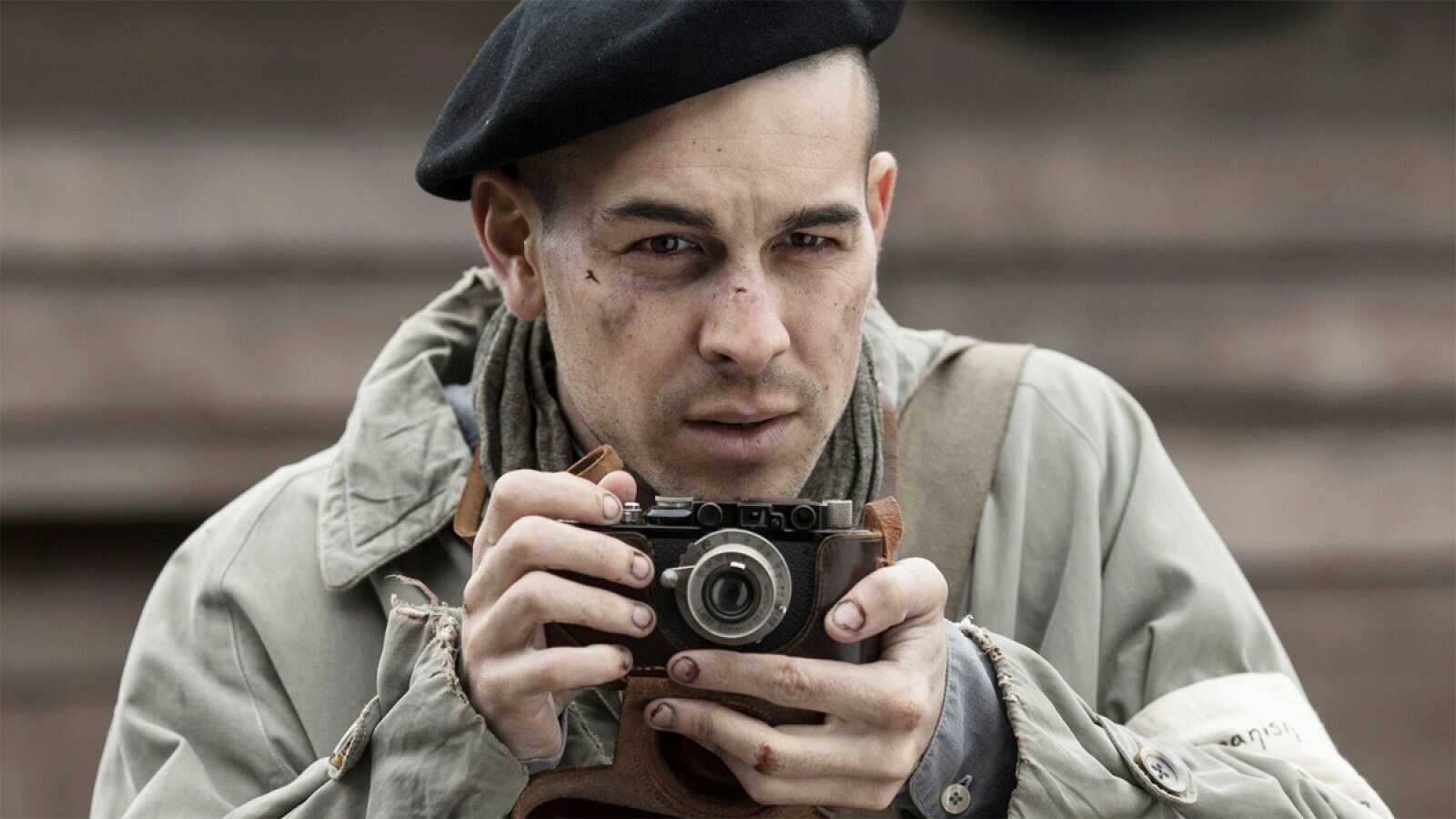Movie Info
Movie Notes
El fotógrafo de Mauthausen
Rated TV-MA
Movie Info
- Director
- Mar Targarona
- Run Time
- 1 hour and 50 minutes
VP Content Ratings
- Violence
- 5/10
- Language
- 3/10
- Sex & Nudity
- 3/10
Relevant Quotes
See how they conceive evil,
and are pregnant with mischief,
and bring forth lies.
They make a pit, digging it out,
and fall into the hole that they have made.
Their mischief returns upon their own heads,
and on their own heads their violence descends.
The meek shall obtain fresh joy in the Lord,
and the neediest people shall exult in the Holy One of Israel. For the tyrant shall be no more,
and the scoffer shall cease to be…
For all who do evil hate the light and do not come to the light, so that their deeds may not be exposed.

Though some grow weary of films dealing with the concentration camps of the Holocaust, I believe we should welcome each as one more piece of evidence of the toxic end result of anti-Semitism. And in the case of Spanish director Mar Targarona’s film, for the additional information about a particular group of her countrymen who were held as slave laborers in Hitler’s huge Mauthausen concentration camp in Austria. At the end of the Spanish Civil War some 8000 Republican fighters were kicked out by General Franco and then arrested in France when the Nazis took over the country, among them Communist Francesc Boix (played by Mario Casas), a left-wing Catalan. His is not just the usual story of survival but of resistance—not with guns but by preserving the photographic evidence of Nazi atrocities so it could be used in war criminal trials after the war—presuming, of course, that the Allies would emerge victorious.
How well Boix and his fellow inmates succeeded and what hardships they faced during incarceration is well depicted, details drawn from the book by Benito Bermejo, The Photographer of Horror (2002). Our hero became a lab assistant to SS officer Paul Ricken (Richard Van Weyden), and then a photographer himself, and so he was in a good position to access the negatives. The Nazis were careful record keepers, documenting the daily life of the prisoners and recording visits by important officials such as Heinrich Himmler and Albert Speer. Many of the prisoners slaved at a nearby quarry where an endless line of them toiled up a set of steep stairs with heavy blocks in baskets upon their back. The kapos, cooperative prisoners put in charge over their fellows, prove even more vicious than the SS guards. One kapo in particular enjoys his position—and, of course, will meet a cruel but just fate at the end of the film.
Along the way Boix befriends the young Anselmo (Adrià Salazar), newly separated from his father. When Boix falsely assures him that his father will be all right, Valbuena (Alain Hernández), head assistant in the photographic laboratory, scolds Boix for keeping back the awful truth from the boy. Anselmo will figure prominently in a later incident at a party the supreme commandant of Mauthausen, Franz Ziereis (Stefan Weinert), hosts in honor of his son’s 10th birthday. Although there are many instances of torture, beatings, and executions, this party incident especially horrified me in that it included an especially brutal SS officer giving the boy a loaded pistol as a present. After teaching him how to shoot it, he guides the boy in pointing the gun at the prisoners serving the guests and calmly shooting two. Anselmo and Boix are also waiters, and though they escape unharmed, at least two of the slave servers are killed. The boy shows no remorse, being cheered by the Nazis looking on—though at least the women look shocked and saddened by this sudden display of cruelty. With the camera frequently focusing on the cherubic face of the boy guided by the leering Nazi officer, I kept thinking of Jesus warning about a millstone being put about the neck of anyone who put “a stumbling block before one of these little ones. (Matt. 18:6)
Another chilling scene is the execution of the hapless prisoner caught tryig to smuggle pictures out of the camp. Led by a band playing music, the victim stands in a cart that stops at the gallows, his fellow prisoners forced to stand and watch. The rope breaks during the first hanging, but a new one holds at the second. Over his shoulder we are shown the prisoners made to pass in front of the hanged man. It is a long sequence, seemingly taken from a documentary. Some of the grim-faced prisoners looking down rather than at the man.
The film is male dominated, so the one involving a female prisoner forced to “reward” a prisoner or guard is welcome. Boix pleases his superiors so much that he is sent into a room where they engage in sex. We will see her later on as Boix distributes negative rolls among the inmates. She was one of many “service women” whom the Nazis used in such a subhuman manner.
Boix and accomplices have been concerned with hiding files of negatives and photos for some time, but when they learn over the clandestine radio that the Russians have defeated the Nazis at the battle of Stalingrad, they redouble their efforts. One of the squences with a bit of humor is the musical revue to which the Nazis are front row guests. The latter. Not understanding Spanish, laugh heartily, unaware that the prisoners, some costumed as women, are singing about the Russians and the Americans who are advancing on the camp. If only this section could have had a happier outcome. Before their eventual retreat the Nazis order the burning of all evidence. That Boix and company succeeded in saving much—over 2000 negatives. We see at the end of the film an archival clip featuring the real Boix testifying at a war crimes trial.
This is one more powerful visual testimony to the horrific results of anti-Semitism and the push back of the human spirit against brutality and despair. Though some scenes are difficult to watch, it is a film that should be seen and discussed in the light of the resurgence of this ancient prejudice in America and Europe. That old slogan is still important, “Lest we forget!” Thanks be to Netflix for making the film so easily available.
This review will be in the February issue of VP along with a set of questions for reflection and/or discussion. If you have found reviews on this site helpful, please consider purchasing a subscription or individual issue in The Store.
Netflix


